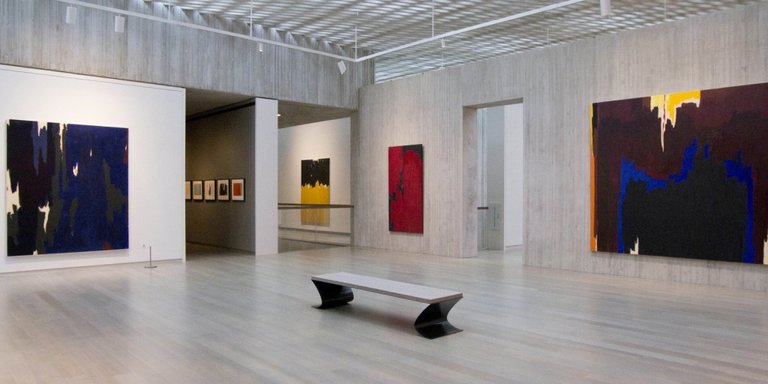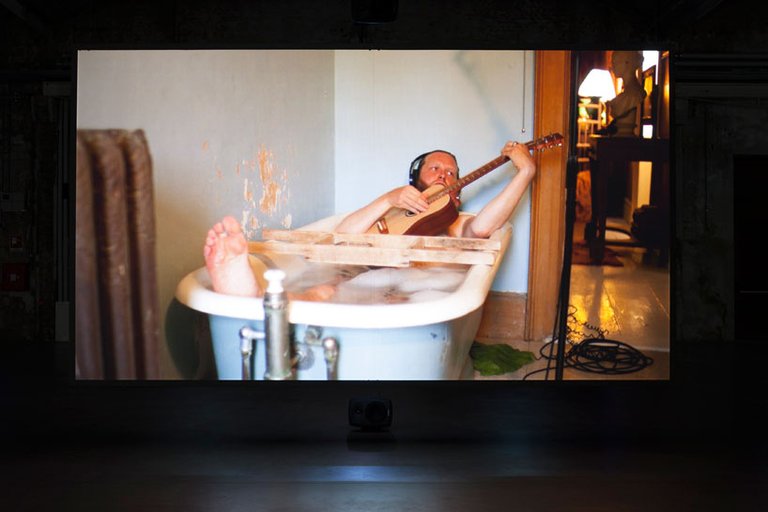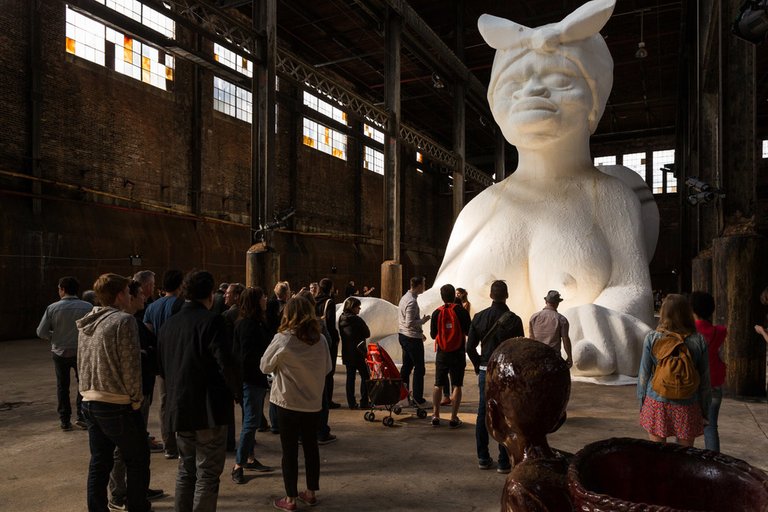A History of Exhibitions - Key Terms
Before launching into my brief history of exhibitions, which might not be that brief, let's establish some criteria for what an exhibition, in the traditional sense is, where it takes place, and some helpful terms that I might use throughout my blogging. We will start light, and the next post will introduce the many different types of institutions that exhibit art.
Contemporary Art
Exhibition
Public Art
Into The Exhibition

- Clifford Still Museum, Denver, CO
Most importantly is the term Contemporary Art, which I will describe as the current period of art making, or the art of our time. However, someday soon there will probably be a period called Post-Contemporary Art or something similar. For our purposes here let's consider Contemporary Art as art that has been made since the late 1970s, treating it like a specific period or chapter like Modernism, Expressionism, etc. This article in (WIDEWALLS) is a bit reductionist but it gives a pretty clear outline of the basic ideas that work just fine for our purposes.
The images below feature one of the nine channels of Icelandic artist Ragnar Kjartansson's epic 64 minute video installation, The Visitors and Kara Walker's monumental temporary sculpture made entirely of white sugar, A Subtlety both give a good sense for just how wide the types of media, subject, and display style the term Contemporary Art includes.

- Ragnar Kjartansson, The Visitors, 2012, nine channel HD video projection, 64 minutes

- Kara Walker, A Subtlety, or the Marvelous Sugar Baby an Homage to the unpaid and overworked Artisans who have refined our Sweet tastes from the cane fields to the Kitchens of the New World on the Occasion of the demolition of the Domino Sugar Refining Plant, 2014, Domino Sugar Factory, Brooklyn, NY, (Creative Time)
An Exhibition is a collection of artworks shown together in a space, often united under a common theme or due to a shared strategy of making or conceptualizing. The dictionary definition of an exhibition: a public display of works of art or other items of interest, held in an art gallery or museum or at a trade fair is the one to keep in mind, particularly as some of the posts ahead will cite exhibition types that expand upon and challenge this definition. Start thinking about alternate forms of exhibitions, things like a dinner, lecture, game, roundtable discussion, screening, etc.

- Kazimir Malevich's 0.10 (Zero-Ten) The Last Futurist Exhibition of Painting, 1915, Petrograd, Russia
The final term for this post is Public Art which again has a pretty straightforward definition: a display of artwork(s), often permanently, in a free public setting like a park, plaza, street, sidewalk, billboard, or building. Public Art is most often a sculpture, mural, sign, mosaic, or structure. Many cities in America, and around the world sponsor or support Public Art programs. One of the most well known city supported programs of Public Art is Philadelphia's (Mural Arts Program), which has populated many walks buildings, and public spaces in the city with large scale mural paintings, and some temporary sculptural and performance based public art.

- Keith Haring, We The Youth, 1987, City of Philadelphia
Keith Haring's original mural from 1987 was later restored and still lives adorning the side of a row house.
This particularly short post is aimed at helping us sort through some key terminology to begin with before I dive headfirst into an abridged history of exhibitions. Many of you might already know these terms, but I hope the images and artworks are new to you!
Stay tuned as we meander through the past, mark the present, and imagine ideas about art and exhibitions in the future.

I'm curious... what might this Post-Contemporary Art movement look like? Have you begun to witness cues to this next phase already? I wonder how technology and craftsmanship might play (or not play) a role in that evolution... Great post @awillbrown
Post-Contemporary Art movement was more of a way to explain that Contemporary Art is a period of sorts, something akin Abstract Expressionism, etc. However I do think we may already be there, in the Post-Contemporary. I tend to think it's about self-awareness and innovation, less in terms of technical tools or craftsmanship but more in terms of awareness and the calculated use of strategies that define and criticize the present so incisively it is hard to argue with, and/or define new ideas about the future-present. This all gets very complicated! Last year summer's Berlin Biennale is a good example of this. Check it out!@voronoi, my sense and note of the
Interesting @awillbrown! I recently heard an artist speak about a kind of "double-consciousness era" that we're entering. That our self-awareness (as you say) of creativity is being divided into consciousness that is physical and something digital. Anyway, I'll have to take a look at the Biennale...!
Congratulations @awillbrown! You have completed some achievement on Steemit and have been rewarded with new badge(s) :
Click on any badge to view your own Board of Honor on SteemitBoard.
For more information about SteemitBoard, click here
If you no longer want to receive notifications, reply to this comment with the word
STOPgreat history writting is awesome :)
Congratulations @awillbrown! You have completed some achievement on Steemit and have been rewarded with new badge(s) :
Click on any badge to view your own Board of Honor on SteemitBoard.
For more information about SteemitBoard, click here
If you no longer want to receive notifications, reply to this comment with the word
STOPThis is a great resource @awillbrown! Looking forward to learning more about exhibition histories.
Thanks @hansikhouse!
Congratulations @awillbrown! You have completed some achievement on Steemit and have been rewarded with new badge(s) :
Click on any badge to view your own Board of Honor on SteemitBoard.
For more information about SteemitBoard, click here
If you no longer want to receive notifications, reply to this comment with the word
STOP